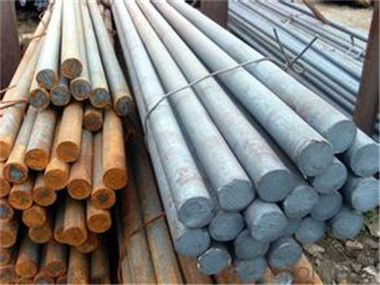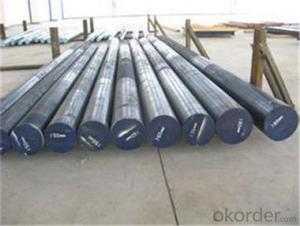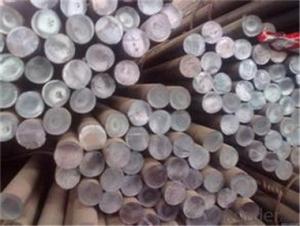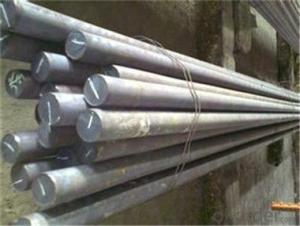Hard Chrome Carbon Round Bar with Good Quality-CNBM
- Loading Port:
- Tianjin
- Payment Terms:
- TT OR LC
- Min Order Qty:
- 60 m.t.
- Supply Capability:
- 2000000 m.t./month
OKorder Service Pledge
OKorder Financial Service
You Might Also Like
Description of steel round bar:
1.Diameter 80 to 800 mm
2.Black or Bright surface
Festures of steel round bar:
4340 Forged Round Steel Bar
1.Dia 80-800mm Length:2000-13000mm or as required
2.Technique:Forged
3.Delivery Time:45 days
Specifications of steel round bar:
Description |
Carbon Steel Rod/Carbon Steel Bar,carbon steel rod,carbon steel shaft,mild steel bar, mild steel shaft,ms bar | |
Material | ASTM | 1005,1006,1008,1010,1015,1020,1025,1030,1035,1040,1045,1050,1055,1060,1065,1070,1080,1084, 1016,1022 |
DIN | Ck10,Ck15,Ck22,Ck25,Ck30,Ck35,Ck40,Ck45,Ck50, 30Mn4,40Mn4 | |
BS | 040A04,095M15,045M10,080A40,045M10,080M50 | |
Standard | GB/T799,ASTM A29,A108,A321,A575,BS970,DIN1652,JIS G4051 | |
Section shape |
Round | |
Length |
As your required | |
Application | Carbon steel rod applies to chemical industry, shipping industry, manufacturing industry,construction,decorate Industry,electric power, pump shafts, sanitary wares,furniture handles,boiler,high temperature resistant,low temperature resistant, corrosion resistant. | |
Images of steel round bar:

FAQ:
1. What is your package?
Packing situation: standard seaworthy packing or as customer required.
2. How long is the lead time?
Delivery time: 45 days after order confirmed.
- Q:How do you measure the hardness of a steel round bar?
- There are various methods to measure the hardness of a steel round bar, with the Rockwell hardness test being the most commonly used. This test involves applying a specific load to an indenter and measuring the depth of the resulting indentation on the material's surface. To measure the hardness of a steel round bar using the Rockwell hardness test, follow these steps: 1. Choose the appropriate Rockwell scale for the steel being tested. The commonly used scales for steel are HRC (Rockwell C) and HRB (Rockwell B). 2. Clean the surface of the steel round bar to eliminate any dirt, oil, or contaminants that could affect the test's accuracy. 3. Place the steel round bar on a flat and stable surface, ensuring proper support to prevent any movement during testing. 4. Select the suitable indenter for the chosen Rockwell scale. For HRC, a diamond cone indenter is typically used, while for HRB, a hardened steel ball is used. 5. Apply a preliminary minor load to the indenter, usually 10 kgf for HRC and 3 kgf for HRB. This ensures proper contact between the indenter and the material's surface. 6. Apply the major load, specific to the chosen Rockwell scale. For HRC, it is typically 150 kgf, while for HRB, it is usually 100 kgf. 7. Allow the major load to dwell for a specific period, typically 15 seconds, to ensure proper indentation. 8. Release the major load while maintaining the minor load. This allows the indenter to partially recover, reducing the depth of the indentation. 9. Measure the depth of the remaining indentation using a microscope or a specialized Rockwell hardness testing machine. The measured value corresponds to the hardness value on the chosen Rockwell scale. It's worth noting that the Rockwell hardness test is just one of several methods available to measure the hardness of a steel round bar. Depending on the specific requirements of the application, other methods like the Brinell hardness test or the Vickers hardness test may also be utilized.
- Q:What is the typical hardness of a steel round bar?
- The typical hardness of a steel round bar can vary depending on the specific grade and composition of the steel. However, most steel round bars have a typical hardness ranging from 20 to 60 HRC (Rockwell Hardness Scale).
- Q:What is the difference between hot rolled and cold drawn steel round bars?
- Hot rolled steel round bars are made by heating a billet or ingot of steel to a high temperature and then rolling it into the desired shape. This process results in a rougher surface finish and less precise dimensions compared to cold drawn steel round bars. Cold drawn steel round bars, on the other hand, are made by pulling a hot rolled bar through a die to achieve the desired shape and size. This process produces a smoother surface finish and more accurate dimensions. Overall, the main difference between hot rolled and cold drawn steel round bars lies in the manufacturing process and the resulting surface finish and dimensional accuracy.
- Q:Can steel round bars be used in the manufacturing of electrical components?
- Yes, steel round bars can be used in the manufacturing of electrical components. Steel is a commonly used material in various industries due to its strength, durability, and electrical conductivity. Steel round bars can be shaped, cut, and machined to form different components such as connectors, terminals, and housings for electrical devices. Additionally, steel's corrosion resistance and affordable cost make it a practical choice for manufacturing electrical components.
- Q:What are the typical hardness values for different grades of steel round bars?
- The hardness values of steel round bars can differ depending on the grade and manufacturing process. However, there are some general hardness values that can serve as a reference. For low carbon or mild steel round bars, the typical hardness values range from approximately 120 to 250 Brinell Hardness (HB). These grades of steel are known for their relatively low strength and hardness, but they can be easily machined and welded. Medium carbon steel round bars, commonly used in applications requiring higher strength and hardness, typically have hardness values ranging from about 200 to 400 HB. These grades of steel are often utilized in construction, automotive, and machinery industries. High carbon or alloy steel round bars, which offer even greater strength and hardness, can have hardness values ranging from 400 to 700 HB or even higher. These grades of steel are commonly applied in applications that demand high wear resistance, like cutting tools, gears, and bearings. It is important to acknowledge that these hardness values are approximate and can vary based on factors such as heat treatment, alloy composition, and the specific manufacturing process used. Therefore, it is always advisable to consult the manufacturer's specifications or perform hardness testing to determine the precise hardness values for a particular grade of steel round bar.
- Q:Can steel round bars be used for making heat exchangers?
- Steel round bars are suitable for constructing heat exchangers. Steel is widely used in heat exchangers because it has great thermal conductivity, high strength, and corrosion resistance. Steel round bars can be easily machined and molded to match the specific design needs of a heat exchanger. Moreover, steel is easily accessible and cost-efficient, making it a popular option for manufacturing heat exchangers in different industries. However, it is crucial to take into account the particular application and operating conditions of the heat exchanger to ensure that the selected steel grade is compatible and capable of enduring the necessary temperature and pressure.
- Q:How do steel round bars compare to brass or copper bars?
- Steel round bars typically have higher tensile strength and are more resistant to corrosion compared to brass or copper bars. Additionally, steel is generally a more cost-effective option. However, brass and copper bars offer better electrical conductivity and are often preferred in applications that require good thermal conductivity or an aesthetically pleasing appearance. The choice between steel, brass, or copper bars depends on the specific requirements of the application.
- Q:What are the advantages of using nickel-chromium-silicon alloy steel round bars?
- There are several advantages of using nickel-chromium-silicon alloy steel round bars. Firstly, this type of alloy steel offers excellent corrosion resistance, making it suitable for various applications in corrosive environments. Secondly, its high strength and toughness properties make it ideal for applications requiring heavy-duty and high-stress resistance. Additionally, nickel-chromium-silicon alloy steel round bars possess good high-temperature stability, allowing them to withstand elevated temperatures without significant deformation or loss of mechanical properties. Lastly, this alloy steel is known for its excellent weldability and machinability, enabling easy fabrication and customization according to specific requirements.
- Q:Can steel round bars be used for making storage tanks?
- Yes, steel round bars can be used for making storage tanks. Steel is a strong and durable material that is commonly used in the construction of storage tanks due to its high tensile strength and resistance to corrosion. Steel round bars can be shaped and welded together to form the structure of the tank, providing stability and support. Additionally, steel tanks can be customized to meet specific storage requirements, making them a versatile choice for various industries.
- Q:Can steel round bars be used for making suspension springs?
- Yes, steel round bars can be used for making suspension springs. Steel is a commonly used material for suspension springs due to its high strength and durability. The round bars can be forged or shaped into the desired spring shape and then heat-treated to achieve the desired spring characteristics. Additionally, steel round bars can be easily machined and drilled to accommodate different suspension systems and components. However, it is important to consider the specific requirements and load capacity of the suspension system to ensure that the chosen steel round bars are suitable for the intended application.
1. Manufacturer Overview |
|
|---|---|
| Location | |
| Year Established | |
| Annual Output Value | |
| Main Markets | |
| Company Certifications | |
2. Manufacturer Certificates |
|
|---|---|
| a) Certification Name | |
| Range | |
| Reference | |
| Validity Period | |
3. Manufacturer Capability |
|
|---|---|
| a)Trade Capacity | |
| Nearest Port | |
| Export Percentage | |
| No.of Employees in Trade Department | |
| Language Spoken: | |
| b)Factory Information | |
| Factory Size: | |
| No. of Production Lines | |
| Contract Manufacturing | |
| Product Price Range | |
Send your message to us
Hard Chrome Carbon Round Bar with Good Quality-CNBM
- Loading Port:
- Tianjin
- Payment Terms:
- TT OR LC
- Min Order Qty:
- 60 m.t.
- Supply Capability:
- 2000000 m.t./month
OKorder Service Pledge
OKorder Financial Service
Similar products
New products
Hot products
Related keywords































